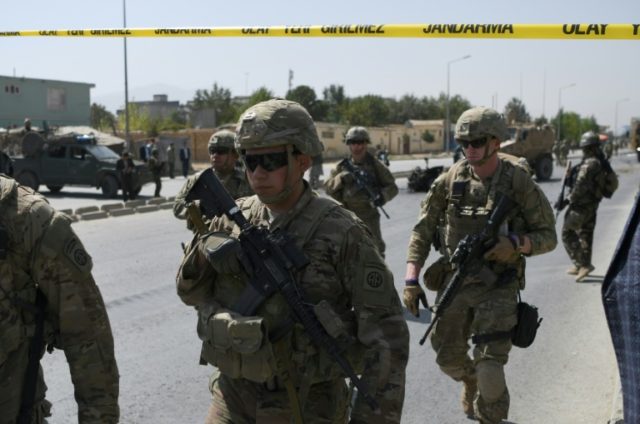American diplomats and Afghan Taliban narco-jihadis, including one of the group’s co-founders, reportedly began the highest-level negotiations so far in Qatar on Monday as part of efforts by U.S. Donald Trump’s administration to end to more than 17-year-old war in Afghanistan.
The discussions in Doha mark the fourth time Taliban militants met with American negotiators led by Zalmay Khalilzad, the U.S. special envoy for efforts to achieve the reconciliation between the Afghan government and the terrorist group, considered the primary tenet of President Trump’s strategy to end to the conflict.
Negotiators are expected to focus on the framework for a deal agreed to “in principle” by the U.S. and the Taliban last month.
Under that framework, the United States would withdraw troops from Afghanistan in exchange for Taliban assurances that Afghanistan will not harbor terrorists, including its ally al-Qaeda and rival the Islamic State (ISIS/ISIL).
U.S. officials also pushed for a ceasefire and the Afghan government participating in the discussions after the last round of negotiations. The Taliban’s reluctance to allow Kabul to engage in the talks has surfaced as one of the top points of contention between the two sides.
Taliban jihadis argue that the Afghan government is an American “puppet.” The group, which is fighting to impose strict Islamic laws or sharia in Afghanistan, considers itself the only legitimate government of the war-ravaged country.
Referring to the last round of talks last month, the New York Times (NYT) notes:
The Taliban negotiators, the American officials said, did not have the authority to discuss a cease-fire or negotiations with the Afghans, and asked for time to return to their leadership.
Now, the presence at the talks of Mullah Abdul Ghani Baradar, the movement’s deputy chief and head of their political commission guiding the negotiators, could bring the Taliban team the decision-making authority they were lacking before.
Afghan President Ashraf Ghani’s administration welcomed Baradar’s participation in the negotiations.
Mohammed Umer Daudzai, Ghani’s special envoy for peace, indicated “he hoped the large meeting would create some consensus among disagreeing Afghan factions and define the red lines for future negotiations with the Taliban,” NYT reveals.
“Mullah Baradar is a person with authority and he has influence among the Taliban. His travel to Doha can accelerate the peace process,” he added, echoing an unnamed senior Taliban jihadi who spoke to BBC.
Baradar’s authority within the group to make decisions could help “speed up the peace process,” the Taliban militant told the British news outlet.
In a statement issued Monday, Zabihullah Mujahid, a spokesman for the Taliban, confirmed that Mullah Baradar attended the negotiators with U.S. diplomats in Doha.
“The agenda of the meeting will be the old issues of ending the occupation and preventing harm to anyone from Afghanistan,” Mujahid told the Times.
There is “a possibility we will reach some results” during the planned four-day negotiations, the spokesman told the Associated Press (AP).
On Monday, U.S. special envoy Khalilzad announced his arrival in Doha “to meet with a more authoritative Taliban delegation” via Twitter.
“This could be a significant moment,” he added. “Appreciate Qatar for hosting and Pakistan in facilitating travel. Now the work begins in earnest”:
Arrived in #Doha to meet with a more authoritative Taliban delegation. This could be a significant moment. Appreciate #Qatar for hosting & #Pakistan in facilitating travel. Now the work begins in earnest.
— U.S. Special Representative Zalmay Khalilzad (@US4AfghanPeace) February 25, 2019
Later in the day, he wrote on Twitter, “Just finished a working lunch with Mullah [Abdul Ghani Beradar] and his team. First time we’ve met. Now moving on to talks”:
Just finished a working lunch with Mullah Beradar and his team. First time we’ve met. Now moving on to talks.
— U.S. Special Representative Zalmay Khalilzad (@US4AfghanPeace) February 25, 2019
Although President Trump has expressed interest in withdrawing troops as long as a residual force remains in the country to ensure the Taliban keeps its promises, the Pentagon insists it has not received any orders to pull any troops out of Afghanistan.
The Trump administration has intensified peace negotiations in recent months. While the U.S. has dropped a record number of bombs on the Taliban and other jihadis as part of its pressure campaign amid the peace negotiations, the Trump administration reportedly ended its air offensive against the group’s revenue engine — opium and heroin.
The ongoing round of peace negotiations that began Monday came as the United Nations reported an unprecedented 3,804 civilian deaths last year mainly at the hands of Taliban improvised explosive devices (IEDs).
Raging since October 2001, the war in Afghanistan has come at an immense blood and treasure cost to the United States — nearly $1 trillion or at least $3 billion per month, 2,278 U.S. military deaths, 20,426 injuries.

COMMENTS
Please let us know if you're having issues with commenting.